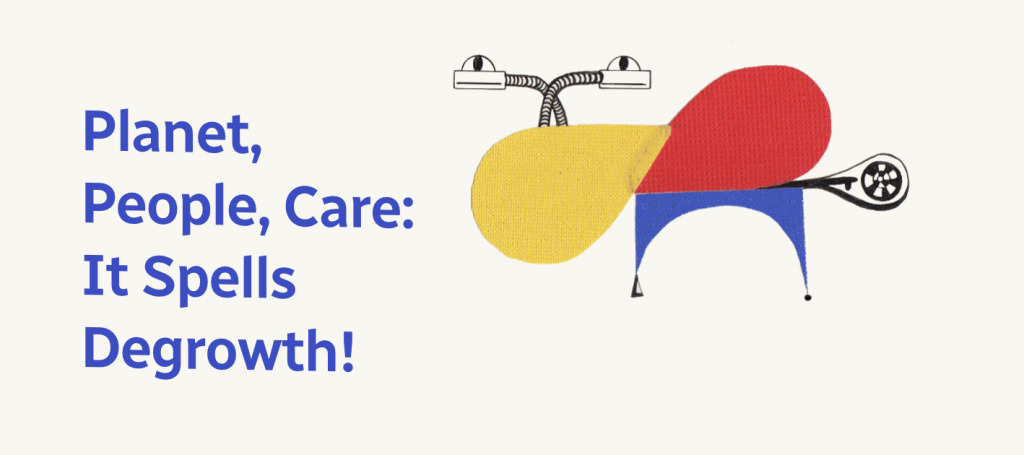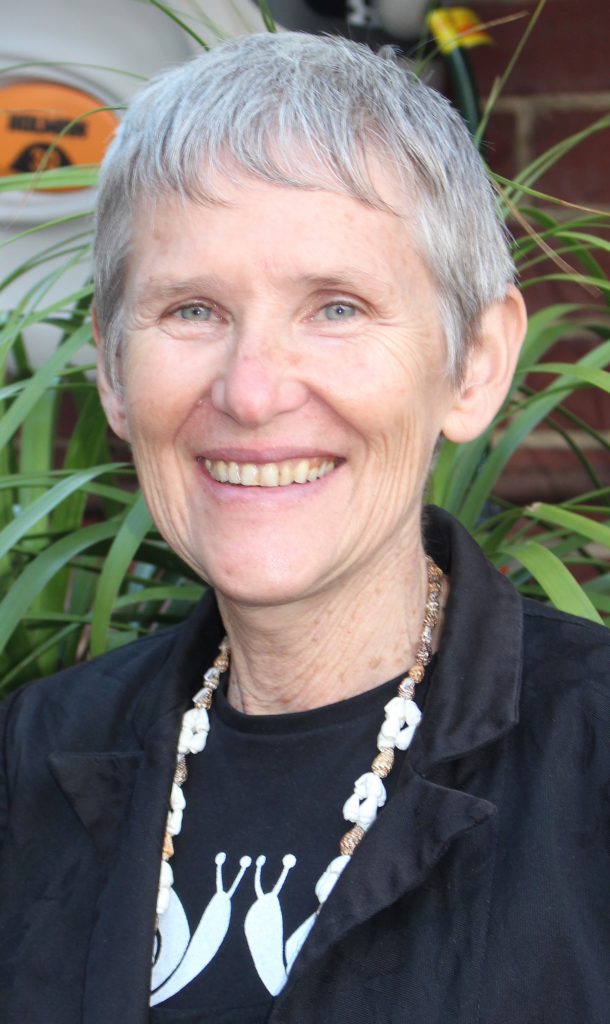Anitra Nelson, scholar-activist and member of Degrowth Central Victoria, reports on a recent international degrowth conference and an international degrowth network assembly which took place in Zagreb in late August and early September.
Zagreb (Croatia) provocatively winks at visitors. A human-scale capital of just one million inhabitants it has grown a museum of broken relationships, a museum of hangovers, a museum of naïve art, a hunting museum, a museum of illusion, a cannabis museum, a new wave museum, a police museum, a museum of selfies and memories (mark the distinction), and a typhlological (touch and feel) museum.
All in all, the perfect location for the Planet, People, Care – It Spells Degrowth 9th International Degrowth Conference, preceded by the watershed 4th International Degrowth Network Assembly (28 August–2 September 2023). A week of thinking, discussion and decision-making, of listening, expressing, relating and play. All bookended by the assembly, and a day of social and creative activities, closing plenary and farewell party at the quaint Youth Centre in Ribnjak’s green and rejuvenating park, close to Zagreb’s central square in the old city district.
Degrowth shares many common values with other social and ecological movements but uniquely ties together concerns for social equity, human well-being, and living within Earth’s limits, with a fatal attack at capitalist dynamics of growth. Degrowth activists and scholars propose postcapitalist visions and strategies in open and diverse ‘pluriverse’ ways.
The conference was launched by the recently elected IPCC Vice-Chair Prof. Diana Urge-Vorsatz (Central European University) in the Museum of Contemporary Art and continued on in the city’s usual venue for large gatherings, Zagreb Fair. Urge-Vorsatz offered a compelling case for questioning growth in the face of out-of-control carbon emissions and increasingly depressing climate changes. Some of the dramatic slides and points made around the extent of climate change are accessible in her earlier speech here.
The conference was limited to around 550 participants, mainly due to Zagreb’s practical circumstances. Its buildings and infrastructure are still being repaired from the most devastating earthquake in 150 years, which hit early in the 2020 Covid-19 outbreak. Then, several weeks before the degrowth conference, around 10,000 of Zagreb’s trees were torn asunder by a summer hurricane, the most destructive in 500 years.
We were warned of impacts on digital technology and multimedia use but, in the event, were able to proceed relatively normally. Indeed, in a workshop co-convened with Vincent Liegey, I was able to show my short film on non-monetary futures, Beyond Money: Yenomon, which is generally considered a degrowth ‘imaginary’ (a degrowth paradigm and/ or vision).
International degrowth conferences are self-organised efforts and generally nest in their specific human and more-than-human locale. Afternoon and evening sessions were open to the wider Zagreb community. On Saturday, activities continued in the youth cultural centre at the very heart of the old city and its surrounding park, again with non-registered participants, especially Zagreb citizens, able to join.
International degrowth conferences generally serve modest yet sufficient vegetarian and vegan fare, encouraging participants to eat as locales do, drawing on dumpster-dived and donated food, and promoting local organic growers and makers. The conference encourages a program of artistic, practical and activist sessions alongside scholarly ones. (The program, abstracts and list of speakers and so on remain online for review.)
Both scholarly and activist programs ran sessions in parallel, with the inherent challenge of deciding between a suite of highly attractive offerings. Current exhibitions at the Museum of Contemporary Art and the special Planet, People, Care – It Spells Degrowth exhibition at the Croatian Association of Fine Artists competed with an environmental film festival for the attention of conference goers into the evenings. The latter held screenings of Benh Zeitlin’s Beasts of the Southern Wild (2012), with an associated discussion of environmental and ecofeminist topics in cinema and theatre, and Camilla and James Becket’s The Seeds of Vandana Shiva, with an associated ecofeminist discussion on food sovereignty.
Keynotes included the Japanese marxologist Kohei Saito speaking on ‘degrowth communism’; the European Society of Ecological Economics vice-president, and host of its Economics for Rebels podcast, Alexandra Köves on utopian thinking; and Roland Nkwain Ngam re-visioning African economies in Africa from degrowth, community-based, climate justice, commoning and international debt reparation perspectives. Degrowth in IV Movements, a poem dedicated to the movement and the conference, can be read online at the University of Sydney’s international Progress in Political Economy site.
The 4th International Assembly of the Degrowth Movement started its business on Monday at 9 am working right through to 7 pm. The assembled formally considered and endorsed in principle the birth of the International Degrowth Network (IDN) based on sociocratic principles. This is a breakthrough in a controversial discussion existent from the very first assembly. I attended two previous assemblies where proposals for a formal international network were stymied in noisy, heated debates.
A clear difference this time round was the practical and political preparatory work conducted by an astute working party of many young degrowth activists who took into account sensitivities and scepticism around hierarchies and the need for a thoroughly horizontalist approach. While some of us remain sceptical they deserve support to give their ideas a try. So, let’s see how the planned IDN operates in practice!
At Monday’s assembly participants divided in regional groups to discuss potential regional circles. There was a handful for Oceania. I was representing Degrowth Central Victoria, associated with Degrowth Network Australia (DNA). Someone suggested that, in Australia, degrowth must be taking off like nowhere else. Three Australians present (two ex-pats of several years) looked querulous. The claimant oriented us, ‘Well, I mean you’re all really socialists there, aren’t you?’ As New South Welshman Nick Fitzpatrick doubled over in stitches, I, a Victorian, scoffed, ‘If only!”
Anitra Nelson is an Honorary Principal Fellow at University of Melbourne, responsible for numerous publications, including co-editing two degrowth collections for Routledge’s Environmental Humanities series Housing for Degrowth: Principles, Models, Challenges and Opportunities (2018) and Food for Degrowth: Perspectives and Practices (2021). Working with Vincent Liegey, Anitra has co-authored Exploring Degrowth: A Critical Guide (2020) and numerous associated articles.
Image credit. Feature image Planet, People, Care: It Spells Degrowth! from the 9th International Degrowth Conference 2023 (CC BY-NC-SA 4.0 DEED).

